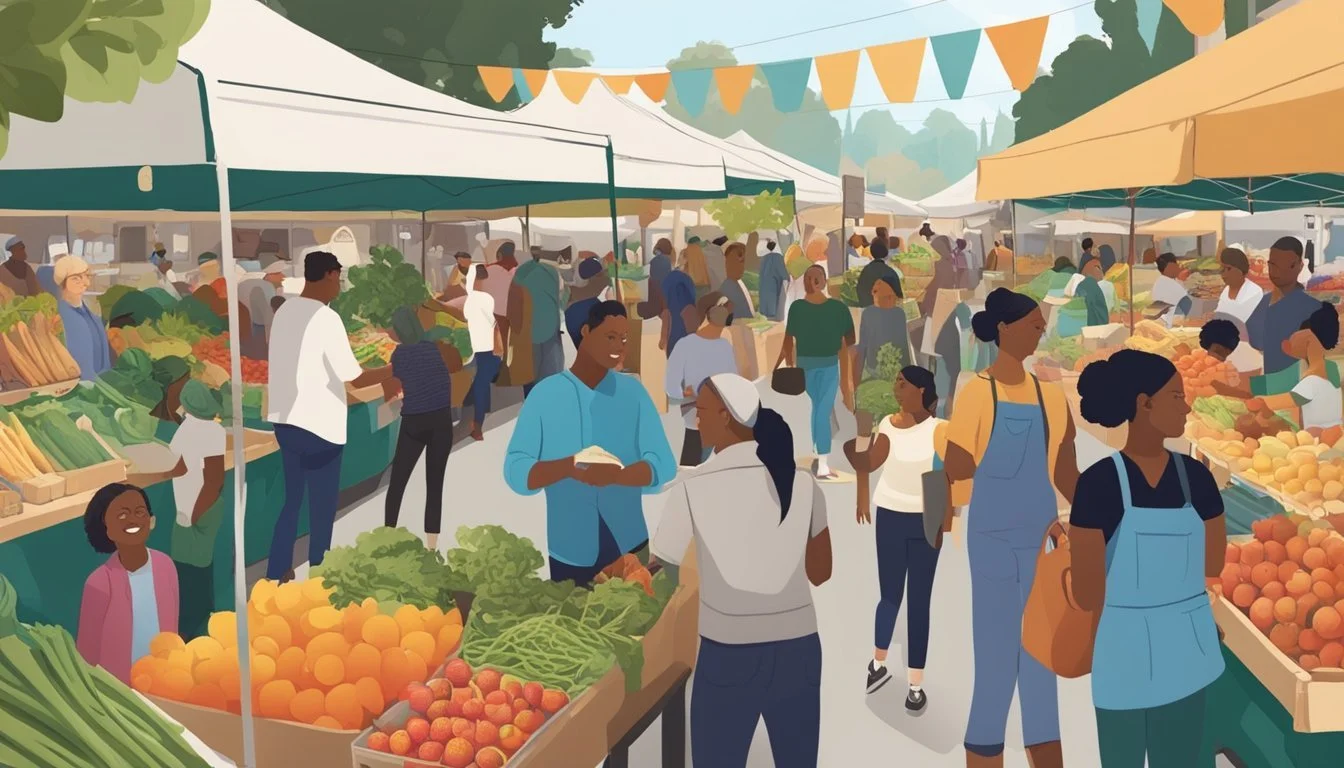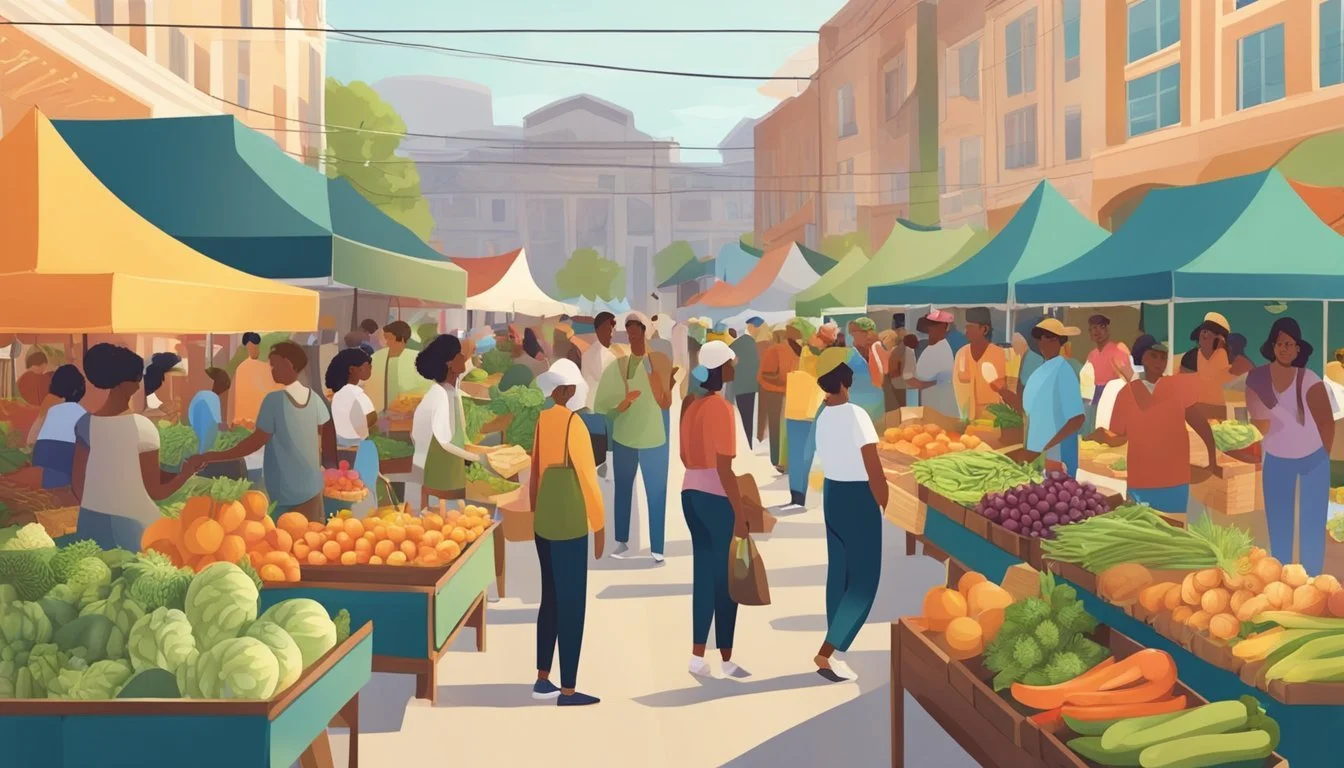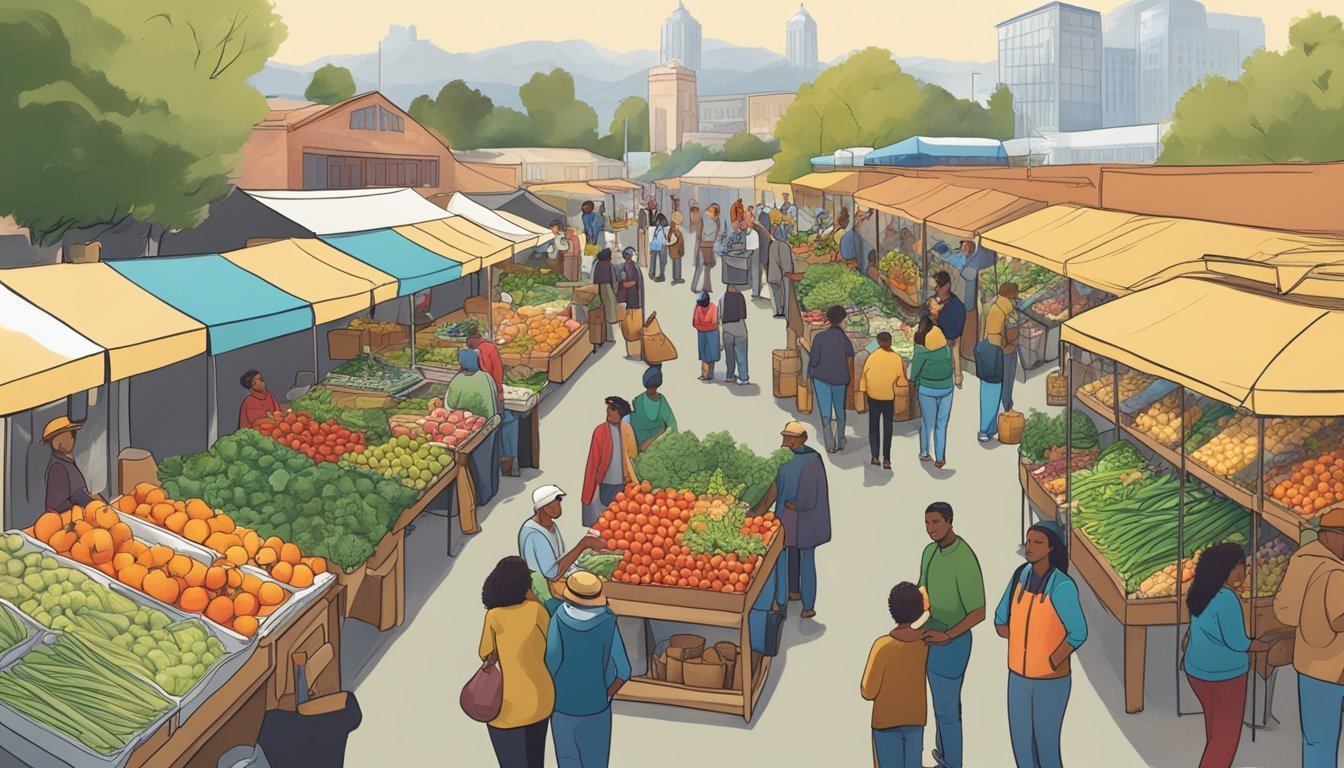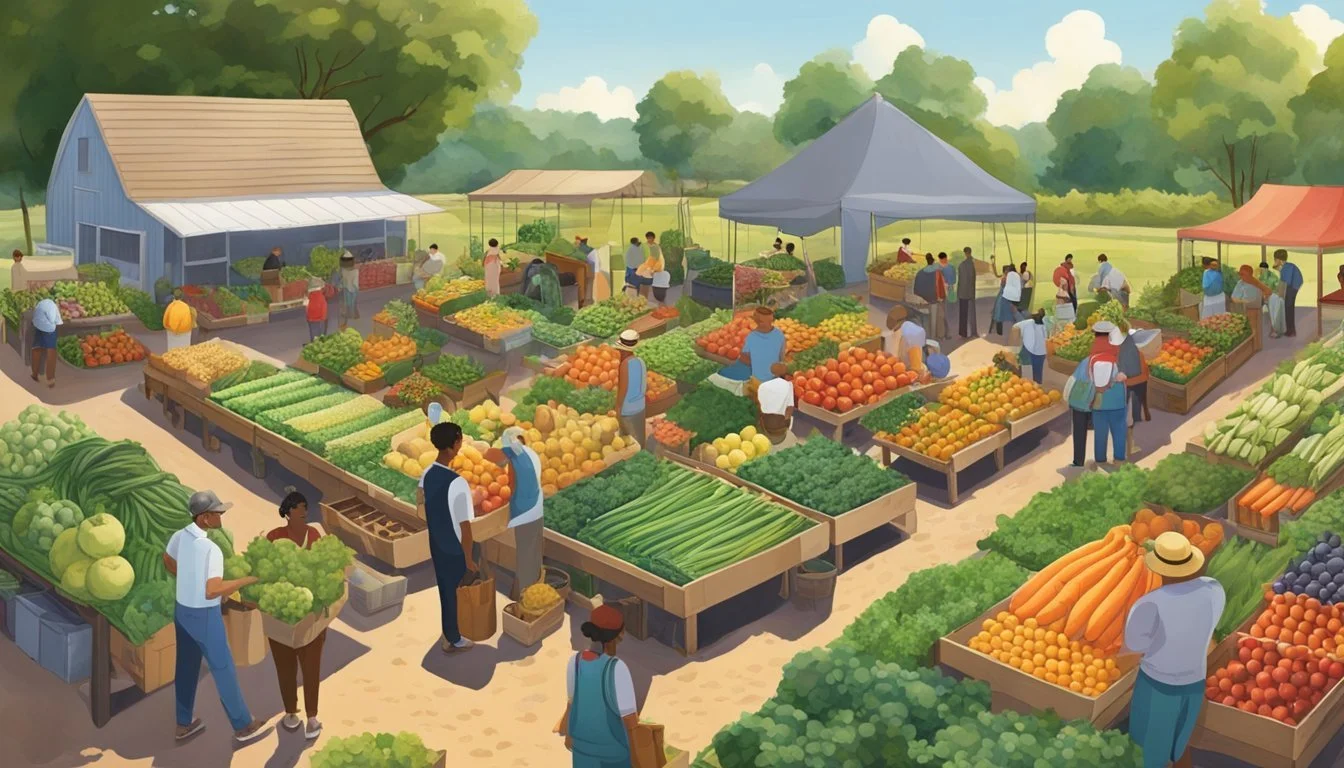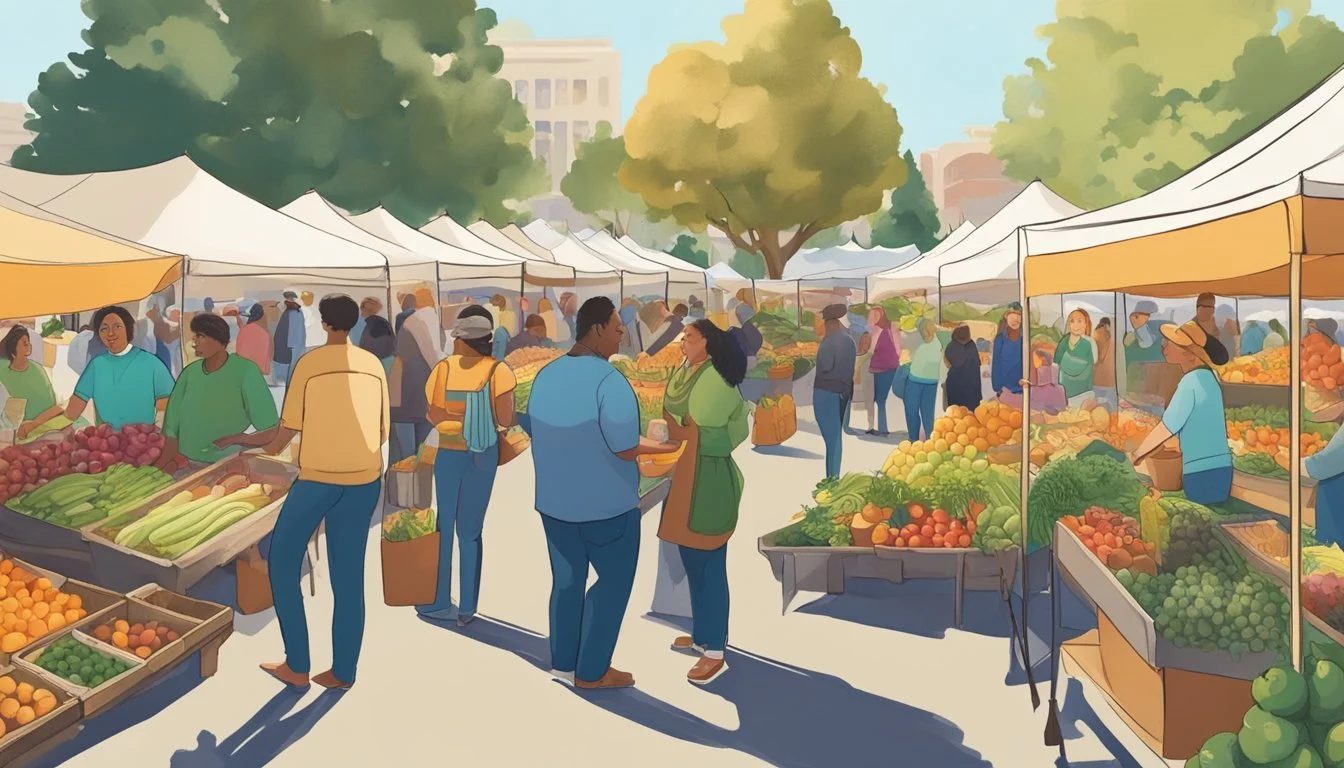Community Supported Agriculture (CSA) in Oakland, CA
Thriving Local Food Networks
Community Supported Agriculture, known as CSA, offers a means by which people in Oakland can buy seasonal produce directly from local farmers. By purchasing a share, referred to as a "membership" or a "subscription," consumers can receive a regular, often weekly, supply of fresh fruits, vegetables, and sometimes additional farm products. This model benefits both the producer and the consumer. Farmers gain upfront capital to support the operational costs of their farm, and consumers enjoy fresh, locally grown produce.
In Oakland, CSA programs contribute to sustainable urban living by bridging the gap between rural growers and urban consumers. Members of the community can support local agriculture, which often follows organic and environmentally responsible farming practices. CSA programs in the area serve as a commitment from Oakland residents to support local agriculture, fostering a stronger community connection to the food web.
Given the fertile landscape of the East Bay and a growing interest in farm-to-table living, Oakland's CSA scene thrives with a variety of options. From small urban operations to larger, rural farms, these programs offer Oakland residents access to high-quality, locally-sourced products. This direct relationship between producers and consumers embodies a mutual pledge to environmental health and community-based food systems.
What Is Community Supported Agriculture (CSA)?
Community Supported Agriculture, commonly known as CSA, is a socio-economic model that fosters a direct relationship between local farmers and consumers. Participants buy shares in a farm's anticipated harvest, providing them with a regular supply of fresh, local produce throughout the farming season.
CSA Model and Principles
The CSA model is built upon a subscription basis where consumers, often referred to as "members," purchase a share of the harvest ahead of the growing season. This financial commitment provides necessary upfront funds for farmers to cover anticipated costs for the season. In return, members receive portions of the farm's crops, typically delivered weekly as a "CSA box." These shares often include a variety of seasonal produce, and sometimes options for organic produce are available.
Principles include:
Shared Risk: Both the members and the farmers share the risk of farming, which may include poor harvests due to adverse weather conditions or pests.
Shared Rewards: Conversely, a bountiful season results in more robust shares for members to enjoy.
Community Engagement: CSA encourages local economies and fosters relationships between farmers and members.
Benefits of CSA Membership
Joining a CSA comes with several benefits for its members:
Access to Fresh, Seasonal Produce: CSA members enjoy regular distributions of fresh-from-the-field produce. This not only means more flavorful fruits and vegetables but also higher nutritional content.
Support for Local Farmers: Membership fees go directly to the farm, providing financial security and stability for local farmers.
Environmental Sustainability: With the local distribution of food, the CSA model minimizes the carbon footprint associated with long-distance transportation.
Additional Advantages:
Health Benefits: Eating fresh, seasonal, and often organically grown produce can contribute to a healthier diet.
Understanding Food Sources: Members gain an appreciation for where and how their food is grown, which can lead to more sustainable consumer practices.
History of CSA in Oakland
In Oakland, California, the concept of Community Supported Agriculture (CSA) has taken root with the wider movement to foster sustainable agriculture and enhance community food security. CSA schemes have been part of Oakland's urban landscape, particularly in areas like West Oakland, where access to fresh produce has been historically limited.
Community Supported Agriculture is a food distribution model where individuals or families become members or "shareholders" of a local farm. In Oakland, members receive regular parcels of fresh, locally-grown produce, contributing to the resilience and sustainability of urban farming practices.
West Oakland, with its urban mini-farms and community gardens, has embraced CSA as a means to combat food deserts and improve nutritional outcomes for its residents. These local initiatives have provided a steady source of fresh, organic produce that might otherwise be inaccessible to urban communities.
CSA originally flourished on the East Coast in the 1980s, and Oakland's iteration of the model reflects a combination of this grassroots tradition and the city's own unique social and ecological consciousness. In recent years, Oakland's CSAs have not only provided food but also education on sustainable agriculture practices to community members.
The table below highlights key CSA entry points in Oakland:
CSA Program Location Notable Practices Cloverfield Organic Farm El Sobrante Organic certified produce, urban farming Farm2Market Alameda Seasonal CSA sessions, diverse produce
These CSAs exemplify Oakland's commitment to adapting the model to meet the needs of a diverse, urban population, promoting both community engagement and environmental stewardship.
How CSAs Work
Community Supported Agriculture (CSA) is an agricultural model where consumers buy shares from local farms in Oakland, CA, providing them with a season's worth of fresh produce. This direct-to-consumer approach fosters a connection between the farm and the community.
Membership and Subscription
Membership in a CSA involves consumers purchasing a subscription, commonly referred to as "shares," from a local farmer. In exchange for their upfront investment, members typically receive a weekly or bi-weekly delivery of fresh, seasonal vegetables and fruits. The subscription model ensures that farmers have a consistent market for their produce while allowing consumers to support local agriculture directly.
Seasonality and Harvesting
CSAs are inherently seasonal, with the variety and quantity of produce reflecting the natural growing cycles. Farmers plan their crop rotations to provide a diverse assortment of CSA box contents throughout the season. Subscribers to CSAs in Oakland can expect to receive items that are currently being harvested, ensuring that the produce is at its peak freshness and flavor.
CSA Box Contents
The contents of a CSA box can vary depending on the time of the year and what the local organic farm is able to grow and harvest. Typically, a CSA box includes a mix of vegetables and fruit. It may also contain other farm products like eggs or honey. For instance, a mid-summer box from an Oakland CSA might boast leafy greens, heirloom tomatoes, plump berries, and crisp cucumbers.
Environmental Impact
The adoption of Community Supported Agriculture (CSA) in Oakland, CA, underscores a commitment to environmental stewardship through sustainable agriculture and a strengthened local food system.
Sustainable Farming Practices
In Oakland, Community Supported Agriculture programs are recognized for their role in promoting sustainable farming practices. These practices include the use of organic methods that eliminate synthetic pesticides and fertilizers, which in turn preserves the quality of the land and reduces contamination of water sources. Live Earth Farm, as an example, follows organic principles that support a healthy ecosystem. Additionally, CSAs often implement regenerative practices such as crop rotation, composting, and intercropping to improve soil health and biodiversity.
Benefits of Sustainable Practices:
Enhances soil structure and fertility
Reduces chemical runoff
Increases biodiversity
Local Food System
Community Supported Agriculture encourages a robust, local food system by directly linking consumers to nearby farms. Phat Beets Produce, an Oakland-based initiative, fosters a connection between residents and local farms offering fresh produce through their CSA, known as the Beet Box. This close relationship reduces food miles, and hence greenhouse gas emissions, as the transportation distance from farm to consumer is significantly minimized. Furthermore, the subscription model of CSAs ensures that farmers receive timely and stable financial support, incentivizing them to maintain sustainable and organic agricultural methods.
Advantages of a Local Food System:
Reduces carbon footprint from transport
Supports local farm economy
Provides access to seasonal, fresh produce
Through these distinct yet complementary approaches, Oakland's CSAs are making considerable strides towards an environmentally friendly food culture.
Social and Economic Benefits
Community Supported Agriculture (CSA) in Oakland, CA, plays a pivotal role in fostering a sustainable local economy and strengthening community bonds. These programs are designed to benefit both consumers seeking nutritious food and local farmers aiming for economic stability within the Bay Area's food system.
CSAs Supporting Local Economy
Oakland's CSAs contribute to the local economy by providing small farmers with direct outlets to sell their produce. They enable consumers to invest in the financial well-being of these farmers, ensuring that more of the revenue stays within the community. For example, Cloverfield Organic Farm, an urban mini-farm in El Sobrante, is both organic certified by CCOF and the Real Organic Project. By participating in CSAs, residents support farms like Cloverfield, fostering a local ecosystem where farmers attain fair compensation, enhancing their ability to thrive in the Bay Area's competitive economy.
Local Farmer Impact: Increases in local food sales directly support the farmers’ livelihoods.
Consumer Impact: Access to locally-grown, organic produce like quinoa, amaranth, and different varieties of mint.
Community Building
Oakland's CSA programs extend beyond mere economic transactions. They serve as a platform for community building, connecting residents with the farmers and the land that provides their food. Initiatives such as the expansion of the Beet Box program by Phat Beets Produce exemplify the role of CSA in creating just food systems. These programs provide small-scale farmers of color in the Central Valley and Coast with opportunities to connect with urban communities, thereby nurturing relationships based on mutual support and understanding.
Just Food System: Promoting diversity and inclusivity within the local food system.
Social Impact: Encouraging engagement between consumers and their food sources, strengthening the local community.
CSA Farms in and Around Oakland
Oakland hosts a variety of CSA farms that cater to the community with fresh, locally-sourced produce. These farms offer a direct way to support local agriculture and access seasonal fruits and vegetables.
Notable CSA Farms
Doorstep Farmers: Located in nearby Contra Costa County, this CSA is known for providing convenient access to local produce for Oakland households.
Full Belly Farm: With distribution across the Bay Area, Full Belly Farm offers weekly organic produce boxes. They are recognized for their commitment to sustainable farming practices.
Urban Tilth: Based in Richmond, Urban Tilth operates a CSA and serves the Bay Area communities, contributing to the urban agriculture movement.
City Slicker Farms: This West Oakland nonprofit provides community members with opportunities to grow and access healthy food.
Distribution and Pick-up Locations
Alameda Pickup: A CSA distribution site is located at 2600 Barbers Point Rd. Alameda, offering seasonal produce with pickups on Fridays between 2:30 PM and 6:30 PM.
Berkeley Distribution: The University of California Gill Tract Community Farm (GTCF) in Berkeley is another option for sourcing organic produce and is part of a community-university partnership project.
Oakland Farm Stands: CSA shares are often distributed through local farm stands throughout Oakland, allowing for convenient pick-up spots for city residents.
These CSAs and locations are integral to the Oakland area, connecting residents with sustainable and locally-grown food options.
Choosing a CSA Program
When selecting a CSA program in Oakland, CA, subscribers should consider specific factors that affect their satisfaction and the benefits they derive from the membership.
Factors to Consider
Subscribers should look for CSA programs that:
Location: Opt for farms close to their area to ensure fresh deliveries, such as those within the Oakland vicinity or neighboring communities.
Produce Variety: Choose programs that offer a wide array of vegetables, and possibly fruits, to enjoy seasonal diversity.
Farming Practices: Ensure the selected CSA follows organic farming methods for healthier, sustainably grown produce.
Pick-up/Delivery Options: Some CSAs provide convenient pick-up locations or home delivery services. Check availability and scheduling.
Support and Community Engagement: Look for farms that encourage visits and offer support like Live Earth Farm, fostering a connection between subscribers and the land.
CSA Membership Types
A CSA subscription can vary in terms of offerings and duration. Typically, subscribers might encounter the following types:
Vegetable Subscription: This is the most common type, focused on delivering fresh, seasonal vegetables.
Meat and Eggs: Certain CSA programs may also offer meat and egg subscriptions, providing locally and ethically raised products.
Subscribers should assess their household's needs and choose the type of CSA program accordingly, considering what types of products are essential for them—be it vegetables, meat, eggs, or a combination.
Youth and Urban Agriculture
Oakland, California, has become a hub for urban agriculture, particularly focusing on engaging youth in sustainable farming practices and education. The city’s initiatives involve a variety of programs that not only provide fresh produce to the local community but also empower its younger residents with valuable skills and knowledge.
Education and Involvement
Urban agriculture in Oakland places a strong emphasis on education and youth involvement. One notable organization, Acta Non Verba: Youth Urban Farm Project (ANV), is a leader in this area, with a mission to elevate life in Oakland by creating safe and creative outdoor spaces for children and youth, particularly in East Oakland. ANV is largely founded and led by women of color, fostering community engagement through hands-on learning experiences. They offer educational child care camps and community-building events that support over 300 local youths annually.
Key Programs by ANV:
Educational Childcare Camps
Community-Building Events
These programs provide the structural support for youth to learn about urban farming, nutrition, and environmental stewardship, creating a foundational impact on the participants' relationship with food and their community.
Urban Farming Initiatives
Urban farming within Oakland isn’t just about growing food; it's about building a community and a sustainable way of living. The West Oakland Farm Park, managed by City Slicker Farms, exemplifies this vision. Spanning 1.4 acres, the urban farm serves as a working farm, educational space, and recreation center conceived by and for the local community members.
Features of West Oakland Farm Park:
Working Urban Farm
Educational Space
Outdoor Recreation Site
These urban farms become important venues for Oakland's youth to gain practical farming experience, access educational workshops, and contribute to food security through local produce cultivation. The presence of initiatives like the West Oakland Farm Park is a testament to Oakland's commitment to integrating agriculture with urban life, emphasizing inclusivity and food justice.
Future of CSA in Oakland
The trajectory of Community Supported Agriculture (CSA) in Oakland, CA, is poised for positive growth. With its foundation of sustainability and local food systems, Oakland's CSAs are expected to become increasingly integral to the city's food landscape. The focus remains on providing healthy, local produce to community members, fostering a closer connection between consumers and their food sources.
Sustainable Farming Practices:
CSAs continue to adopt and innovate sustainable farming techniques.
The integration of organic and regenerative methods supports soil health and biodiversity.
Educational Outreach:
CSAs prioritize outreach, aiming to educate Oakland residents about the benefits of local and sustainable food systems.
Workshops and farm visits enhance community engagement and support.
Support for Local Economy:
Oakland's CSAs provide economic benefits by keeping food dollars within the local community.
They offer opportunities for local farmers to gain a reliable income stream.
The future suggests a blend of traditional practices with innovation in CSA models. Initiatives like Acta Non Verba's Youth Urban Farm Project exemplify this by combining urban farming with youth development. The CSA model is increasingly recognized not just as a source of fresh produce but as a hub for community-building and education, which in turn supports broader social and environmental objectives.
In sum, Oakland's adoption of CSA is more than a fleeting trend. It is a step towards a sustainable, health-oriented future with strong community ties and a steadfast commitment to innovation. The city's residents can look forward to continuing their support and participation in these thriving networks.

